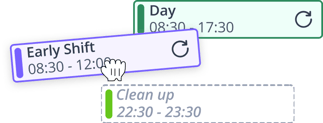Is your restaurant in the weeds? Between soaring staff turnover, complex compliance risks, and slim profit margins, your business can quickly stagnate, if not retrogress.
That's where HR comes in.
It swoops in and becomes the backbone that supports your restaurant, jumpstarting it to evolve and grow. Learn how to set up a robust HR framework tailored to the restaurant industry, addressing unique challenges and needs. Discover practical insights to build a resilient and efficient HR structure, enabling your restaurant to thrive in today's competitive landscape.
Restaurant HR Set up Strategies
The following steps will guide you into establishing a solid HR infrastructure for your restaurant.
Determine Your HR Needs
First, assess your current and future HR needs.
Factor in your restaurant's size, staffing levels, type, peak seasons, compliance risks, budget, and long-term goals. These factors will help you determine the scope of HR roles and infrastructure needed.
Common restaurant HR needs include recruiting, orientation, training, payroll, benefits management, and ensuring legal compliance.
Develop a Solid HR Plan
Once you've determined your HR needs, you can develop an HR plan. This is the roadmap to guide your HR efforts in the right direction.
- Assess your existing HR practices, if any. Identify what's working well and what needs improvement to help you tailor the HR plan to your restaurant's unique circumstances.
- Define your HR goals and objectives.
- Define the HR roles and responsibilities.
- Determine the budget and resources needed to execute your HR plan effectively.
- Create a timeline with specific milestones and deadlines for implementing various HR initiatives. These will help you stay on track and measure progress.
Create HR Policies and Procedures
HR policies and procedures are essential for ensuring your restaurant runs smoothly and efficiently.
They should cover:
- Hiring and onboarding
- Performance management
- Compensation and benefits
- Discipline and termination
- Anti-discrimination and harassment
- Safety and security
Developing HR policies and procedures can be challenging. It's essential to consult with professionals, including attorneys, to ensure they comply with all applicable laws and regulations.
Identify the Key HR Roles Needed
To manage HR effectively, you'll need dedicated staff, including:
- HR Manager – oversees all HR operations.
- Recruiter – focuses on hiring and sourcing job candidates by posting openings, screening applicants, and checking right to work.
- Payroll/Benefits Administrator – manages payroll, pensions auto-enrolment, holiday pay, sick pay, and other benefits.
- Training Manager – conducts new hire orientation and ongoing training to meet food safety and other restaurant-related regulations.
- Employee Relations Specialist – handles employee disputes, conflicts and grievances while promoting a positive work environment.
- HR Assistant(s) – administrative support staff to assist in various HR operations.
Each restaurant is unique, and so are the exact HR roles it needs. It's best to consult professionals to ensure you create a top-notch HR team.
Implement Your HR Plan
Once you have developed your HR plan and created your HR policies and procedures, implementation can begin. Roll out policies, hire HR staff, implement payroll and applicant tracking systems, and deliver manager training if needed. It may also involve changing your existing HR practices or developing new ones.
Communicate your new HR plan, policies, and procedures to all employees clearly and concisely. You may also want to provide training to employees on the new policies and procedures.
Monitor and Evaluate Your HR Program
Once your HR program is in place, monitor and evaluate it regularly to identify areas where it can be improved.
This evaluation can help you gain invaluable insights into:
- Employee satisfaction
- Turnover rates
- Compliance with laws and regulations
- Achievement of HR goals and objectives
Conduct staff surveys and audits to identify gaps. Proper HR management is ongoing; update these policies and procedures as laws and best practices evolve.
Features of a Great Restaurant HR

A high-performing workforce is essential to thrive in the challenging restaurant industry. The right HR program and personnel attract top talent, motivate employees, and create an engaged workplace culture.
Some top features of a great and effective restaurant HR program include:
- Efficient Recruiting and Hiring – Robust processes to source, screen, and onboard qualified staff quickly using online job boards, staff referrals, and apprenticeship programs.
- Strong Training Programs – Thorough new hire orientation plus ongoing training covering company culture, products, safety, customer service, and leadership skills.
- Effective Performance Management – Fair performance reviews, feedback processes, and coaching to develop staff and handle discipline issues constructively.
- Offers Competitive Compensation – Compelling pay and benefits according to market standards and reviewed annually. It also provides incentives like bonuses and profit sharing to reward and retain top performers and motivate other staff to improve performance.
- Promotes a Harmonious Work-Life Balance – Engages in flexible scheduling, PTO, and other policies recognising staff's lives outside work.
- Is Big on Clear Workplace Communications – Has open-door policies, regular staff meetings, suggestion boxes, and other initiatives to keep employees informed and involved.
- Observes Compliance & Risk Mitigation – HR conducts regular mandatory harassment training, audits of pay and tip practices, safety protocols, and other measures to avoid lawsuits and penalties and promote workplace safety.
Best Practices When Setting up HR in a Restaurant
Developing and implementing an HR program in your restaurant is just a piece of the puzzle.
Consider the following best practices to cement a tailored HR infrastructure:
Recruitment and Staffing
These two remain a leading challenge for HR professionals, but there's an effective workaround:
- Identify Staffing Needs – Analyse your restaurant's roles, peak periods, and capacity to determine the required staffing levels and skillsets. This will help you recruit suitable candidates for the job.
- Create Effective Job Descriptions – Write appealing job postings that capture your restaurant's culture. Outline the duties, hours, pay, and qualifications clearly to attract suitable applicants.
- Recruitment Strategies – Leverage online job boards, social media, recruitment agencies, professional networking sites, and employee referrals to source candidates.
- Interviewing and Selection – Use a multi-stage interview process with multiple managers to evaluate skills, experience, and cultural fit. However, make the final hiring decisions collaboratively.
- Onboarding and Training – Invest in a robust onboarding program covering company culture and detailed role training. Ongoing training is vital to hospitality excellence.
Employee Engagement and Retention
The restaurant industry is notorious for high turnover rates.
The National Restaurant Association reports that the average employee turnover rate in the restaurant industry is more than 70%. So, how can a restaurant HR mitigate this challenge?
- Employee Engagement Strategies – Encourage open communication, employee input, feedback, and regular recognition to drive engagement. Engaged team members are an excellent recipe for superior service and customer experiences.
- Recognising and Rewarding Staff – Celebrate wins big and small with shout-outs, awards, team events, and monetary incentives like bonuses. Everybody loves rewards for a well-done job; it boosts morale and retention.
- Investing in Ongoing Training and Development – Employees stay where they can develop their skills. Provide regular refresher training on core skills, leadership development, external education support, and develop programs for advancing stand-out employees.
- Reducing Turnover – Foster a positive work environment and growth opportunities. Conduct stay and exit interviews to help you understand why an employee is leaving.
Compliance and Regulations
Your restaurant can lose a whopping $4 million in a single non-compliance event. With non-compliance costs increasing by 45% in the last decade, how can HR ensure legal and regulatory compliance?
- Understanding Labor Laws – Review federal, state, and local employment laws regularly. Consult attorneys and other labor-related professionals when needed to ensure ongoing compliance.
- Prioritise Health and Safety Standards – Maintain rigorous food safety, sanitation, and workplace safety protocols. Ensure you train your staff rigorously on compliance with health and safety standards.
- Managing Payroll and Taxes – Use reliable restaurant-specific payroll software to calculate wages, tips, and tax deductions accurately.
- Conduct Regular Audits and Self-assessments – Identify any compliance gaps that need addressing. Review policies, procedures, training records, and documents to catch issues proactively.
- Maintain Accurate and Compliant Employment Records – Securely store documents such as identity and employment authorisation forms, tax documents, leave and time records, and hiring paperwork.
Besides hefty penalties, non-compliance can damage your restaurant's reputation, leading to lost customers and future business opportunities.
Performance Management
An effective performance management process is vital for restaurants to track employee progress and address issues promptly. It ensures that your staff aligns with your business objectives through continuous development.
- Setting Performance Expectations – Collaboratively develop job-specific standards and metrics for success and reinforce them often.
- Feedback and Reviews – Provide regular coaching and constructive feedback through annual performance reviews to align on development areas. Offer support and corrective action consistently to resolve issues as needed.
HR Technology
Leveraging HR technology, such as HRIS and employee scheduling software, can help you streamline processes, gain insights, and optimise your HR strategy.
- HR Software and Tools – Automate administrative workflows for recruitment, onboarding, communication, and more with tailored software.
- Data-Driven Management – Analyse turnover metrics, guest feedback, sales data, and other insights to refine HR programs and make data-backed decisions.
The right restaurant technology significantly enhances productivity for delivering exceptional guest experiences and results. These solutions boost efficiency and reduce your administrative burdens.
Employee Wellbeing and Work-Life Balance
The restaurant environment can be highly stressful for your employees. Prioritising employee wellbeing and work-life balance helps to maintain happy and healthy staff.
- Promoting Wellbeing – Offer benefits like counseling, stress management resources, and wellness initiatives to support your staff's mental health.
- Work-Life Balance – Design restaurant schedules with adequate rest periods and encourage employees to take time off as needed. Also, consider integrating PTO requests into your HR plan.
Restaurants with robust wellness programs see tangible benefits, including 25% lower turnover and 50% reduced healthcare costs.
Shiftbase: Your Tool for Optimal Restaurant HR
Navigating the winding road of building your restaurant's HR infrastructure doesn't have to be complex. With these strategies and Shiftbase HR tool, you now hold the secret recipe to crafting a stellar HR program designed specifically for your restaurant's needs.
With Shiftbase you can easily manage all employee data in one central place. Try Shiftbase free for 14 days so you can focus on what matters most – your staff and customers.




